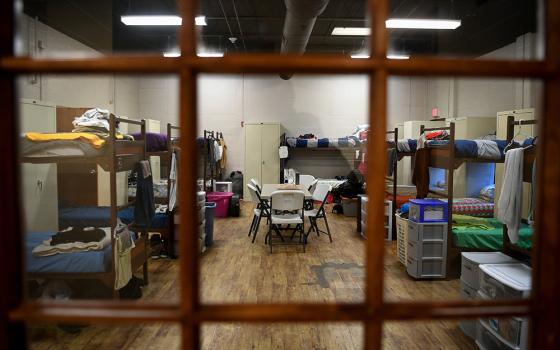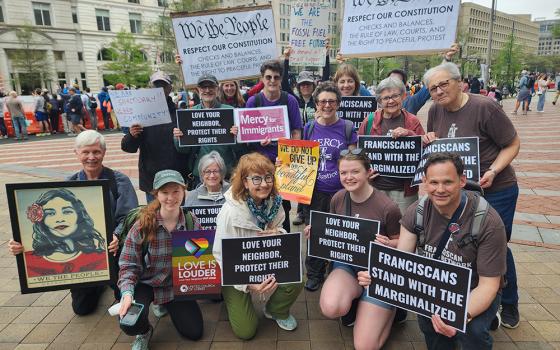At Verdun in France, furrowing farmers still unearth the relics of World War I in the bone slivers of long-dead soldiers clinging to their plow blades as doomed passengers did to the uplifted hull of the sinking Titanic.
There are spaces, such as above the battlefields of Verdun or the sealed-over sea above the Titanic, where air has never been cleared of sorrow despite the thousand and more storms that have brooded and broken over them during the last century.
Unlike the villages crushed by the salient that spread out from the invasion of France in World War II, those ancient towns that choked on the spilled blood of Verdun's unending attacks, gaining a hundred yards one day and yielding them back the next, have never revived. Sadness rises like a great sigh from the still-deformed land, signing the air, as autumn bonfires do, with the melancholy of mourning that has never been finished.
So, too, the surface of the Atlantic, despite the robotic surgery that has removed dinner plates and shaving mugs from the Titanic broken open far below, heaves, now gently and now violently, with a sadness, at once as sacred and silent as that of Verdun, that is deepened by our knowing that before a mechanical arm snatched them out of the vessel's decaying innards, these homely artifacts were once touched or held by hands not much different, any more than their dreams and longing to love and be loved were, from our own.
Sept. 11 has become for Americans what the poet John Milton called a "region of sorrow." Will its end-of-summer air be forever seeded with the heartbreak smoke rising from the slash of terrorism's invisible blade across the bared neck of New York that has now cut a gash across the bowed neck of the Middle East?
We drink from the chalice of the Eucharistic Mystery of the separation of the body and blood of the Lord in which, whether we name it or not, we all live together. Religious Mystery is not something to be solved or that can be explained logically; it can only be entered and experienced as that in which we recognize each other's humanity, even as we take stock of our own. We come, in our human griefs and glories, to understand some truths about life that lie beneath the camouflage of superficial culture.
If life is not a reality show that scatters vicarious thrills on us as a potentate does alms on beggars, neither is it an illness that can be cured by the pills hawked on television ads for everything from low testosterone to high anxiety over sexual performance -- call now and we will send you two orders for one, just pay for shipping and handling. Nor can the contemporary version of "Bread and Circuses" make existence a game to be played as if we dwelt together in some fantasy football league in which, through shrewd if imaginary trades and deals, we can control our destinies. That is what St. Paul left behind when he wrote that he had put away the things of a child.
The sadness that flows over September's cup allows us to grasp the meaning of the religious myths still demeaned by being explained literally. Their significance is always spiritual or psychological. Of no biblical myth is this more true than of that of Original Sin and our being cast out of what we call, as Islam does, a Garden of Eden.
Men and women are condemned to something they had not known in Eden, sorrow and suffering as they make their passage through life. This is often interpreted as a consequence of their discovering lust, which, from this vantage point in history, does not seem a very Original Sin at all. In fact, to burden people with a sense of their being sinful because they are sexual is one of the great and unnecessary causes of suffering generated by a concrete and literal reading of the scriptures.
The myth of Eden is better understood as an attempt to explain the human condition; that is, the imperfect state whose sufferings are no less real for our being able to balance them out or at least bear them with love. Our being banished from Eden tells us a story with a subject as true as the sunrise, but where details are shooting stars in comparison.
This myth is about this September and the endless Septembers that leave us halfway between the noisy joys of summer and the silent sleep of winter; that is, as human beings who live not in the eternal now of Eden but in the fast-ending days and quickly passing seasons of time. The story is far richer than literalists can fathom because it tells how time is both mother and father to all sadness and how, feeling its joys of expectation and hope, we are also subject to its penalties of separation and loss. How could we have ended up in the grip of time and sorrow if there is not a place of eternity and joy?
Why does sorrow survive the drift of the wind for all of us humans? This is a condition of the religious Mystery, the human condition that is always imperfect and whose hollows and clefts can only be filled in with love. There would be no love if we were immune to loss or if we were perfect, the way, say, a stack of plastic chairs reflects the spurious perfection that can be stamped into dead material but never on living human beings whose imperfection makes them long for love but makes them vulnerable to its loss as well.
Our exile is a function of being tuned out of the Eternal, as imagined as a Garden, into Time, the governing dynamic of the human condition. That is always in the air around us, but we feel its penalty more keenly at moments of great human loss and suffering. "There is no cure for autumn," one of John Cheever's characters says, and there is no cure for the human condition that is marbled with loss and gain and with the sacramental revelation, found in the lives of those who died on 9/11 this year or 11 years ago, of the simple goodness of ordinary people.
[Eugene Cullen Kennedy is emeritus professor of psychology at Loyola University, Chicago.]
|
Editor's note: We can send you an email alert every time Kennedy's column, Bulletins from the Human Side," is posted to NCRonline.org. Go to this page and follow directions: Email alert sign-up. If you already receive email alerts from us, click on the "update my profile" button to add Kennedy to your list. |



